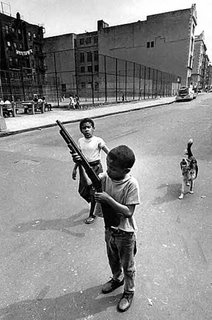The Molding of a Man

“He felt his pocket; the gun was still there. Ahead the long rails were glinting in the moonlight, stretching away, away to somewhere, somewhere where he could be a man…”
Richard Wright
"The Man Who Was Almost a Man"
As an African American living during the early twentieth century, Richard Wright was well aware of the consequences of prejudice and discrimination. The quote is the last line of his short story which relates the tragic story of a young African American boy who mistakenly believes that he will gain respect and acceptance through the power of a gun.
When people are denied basic respect, rights, and acknowledgement, they seek it in whatever ways that they find available to them. This is not only the case with people of different ethnicities, but also of those who find themselves denied these rights because of their economic or social position within the community. The urge for acceptance and basic rights becomes so great that many have turned to violence in an effort to force acknowledgement. Sadly, the result is not respect, but simply pain for both the target of the violence and the aggressor.
Debate about accountability and the degree to which we should acknowledge special circumstances like prejudice can be seen throughout history and is quite evident in today’s courtrooms. Arguments about accountability aside, the quote and the title of the short story point out an important message; violence should never be part of the criteria for making someone a man or respected person. Whether or not you believe that some wars are justified or that people have a right to carry guns is your own opinion, but when people define themselves through a tool of violence, they loose respect for the lives of others.
The young boy in Wright’s story is trapped in an impossible predicament. He cannot truly be a man simply through the ownership of a gun, but neither can he be a man in the eyes of white society because they refuse to see him as an equal. In the present time, we can learn from Wright’s story by remembering that a lack of respect for another’s life, whether it is through violence or prejudice, causes pain on both sides.
What are some current examples of people’s use of violence in an attempt to be acknowledged?
Although the message of tolerant respect is a simple one, why is it a lesson that people still struggle with today?
Despite the fact that violence does not make someone a “man,” when, if ever, is violence an acceptable means to achieve an end?
--Carrie

 Breaking The Mold Studio
Breaking The Mold Studio

0 Comments:
Post a Comment
<< Home